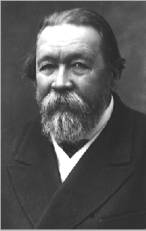|
Mikhail Ippolitov-IvanovNé à Gatchina (prés Saint-Pétersbourg) le 19 novembre 1859. Mort à Moscou le 19 novembre 1935. |
| Mikhail Ippolitov-IvanovElève de Rimski Korsakov Maître de Reinold Glière et de Sergeï Vasilenko
Mikhail Ippolitov-Ivanov was born in 1859 at Gatchina, near St. Petersburg, where his father was a mechanic employed at the palace. He studied music at home and was a choirboy at the cathedral of St. Isaac, where he also had musical instruction, before entering the St. Petersburg Conservatory in 1875. In 1882 he completed his studies as a composition pupil of Rimsky-Korsakov, whose influence was to remain strong. Ippolitov-Ivanov's first appointment was to the position of director of the music academy and conductor of the orchestra in Tblisi, the principal city of Georgia, where he was to spend the next seven years. This period allowed him to develop an interest in the music of the region, a reflection of the general interest taken in the music of non-Slav minorities and more exotic neighbours that was current at the time, and that was to receive overt official encouragement for other reasons after the Revolution. In 1893 Ippolitov-Ivanov became a professor at the Conservatory in Moscow, of which he was director from 1905 until 1924. He served as conductor for the Russian Choral Society, the Mamontov and Zimin opera companies and, after 1925, the Bolshoi Theatre, and was known as a contributor to broadcasting and to musical journalism. Politically Ippolitov-Ivanov retained a measure of independence. He was president of the Society of Writers and Composers in 1922, but took no part in the quarrels between musicians concerned either to encourage new developments in music or to foster a form of proletarian art. His own style had been formed in the 1880's under Rimsky-Korsakov, and to this he added a similar interest in folk-music, particularly the music of Georgia, where he returned in 1924 to spend a year reorganizing the Conservatory in Tblisi. He died in Moscow in 1935. The suite "Kavkazskiye Eskizi" (Suite caucasienne), written in 1894, is a further example of Ippolitov-Ivanov's debt to Rimsky-Korsakov, as well as to the influence of folksong, in this case the music of Georgia, on his work, an element apparent in the 1882 "Spring Overture" [Yar-khmel] and in the biblical scenes that formed the opera "Ruf'" (Ruth). A member of the generation that followed the innovations of the Mighty Five and the technical improvements in musical education brought about by the Rubinsteins, [Ippolitov-Ivanov] coupled soundness of technique with musical inspiration that often drew sustenance from the exotic, whether from Armenia or the Caucasus, Uzbekistan or Azerbaijan. In this he followed the example of composers like Rimsky-Korsakov, satisfying the Soviet encouragement of the use of regional material. His style remained conservative, with music that continued in the traditions of the 1880's, even in his final works. « Kavkazskiye Eskizi » Suite caucasienne N°1, Op.10 1894
Naxos 8.553405 « Kavkazskiye Eskizi » Suite caucasienne, N°2, « Iveria » Op.42 1894
Naxos 8.553405 Marche turque, Op.55 Naxos 8.553405 Scènes turques, Op.62
Naxos 8.553405 |
|
|
|


